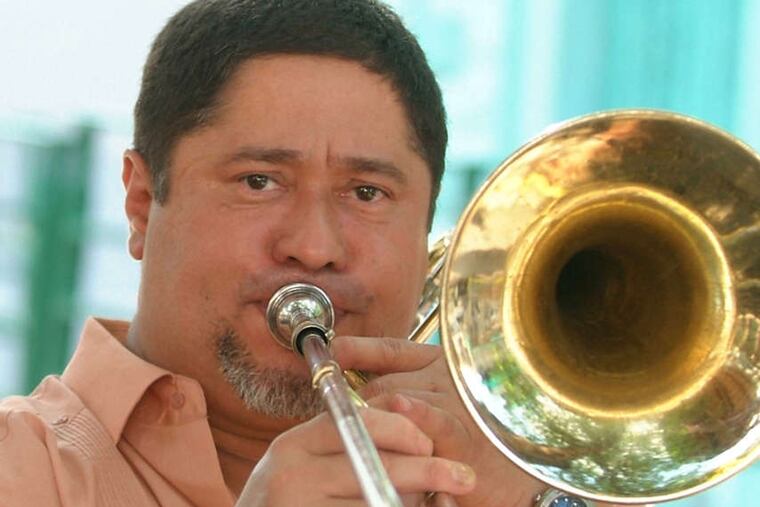Philly-born Latin jazz, plus spice
Trombonist Angel "Papo" Vazquez has long credited music for rescuing him from the streets of North Philadelphia, where he grew up. The neighborhood around his home near Eighth Street and Indiana Avenue was divided by gang rivalries, which he strove to avoid.

Trombonist Angel "Papo" Vazquez has long credited music for rescuing him from the streets of North Philadelphia, where he grew up. The neighborhood around his home near Eighth Street and Indiana Avenue was divided by gang rivalries, which he strove to avoid.
"Philadelphia was pretty segregated back then," Vazquez recalls. "I remember having to run from my house to my high school and back again before I got run out of the neighborhood."
But that uneasy intermingling of African American and Latino also contributed to Vazquez' love of jazz and of traditional Puerto Rican music. If music saved him from the neighborhood, the neighborhood paved the way toward his innovative Latin jazz sound.
"My father and grandfather ran bodegas," Vazquez explains. "I remember, as a young man, bringing deliveries to a gentleman in the black community, and he'd invite me to sit down and play me some jazz. I grew up surrounded by music."
The fruits of that upbringing will be on lively display Saturday, when Vazquez, 55, brings his Mighty Pirate Troubadours septet to the Painted Bride to headline their "Bésame Brew" annual fund-raiser. The band, whose last performance at the Bride was recorded for a Grammy-nominated CD release, will play from their latest album, Oasis, which features guest appearances by Wynton Marsalis and Regina Carter.
The event, which will also feature a silent art auction, dinner, karaoke singing, and salsa dance instruction, celebrates 40 years of jazz at the Bride. Before Vazquez' show, there will be a performance by a quartet version of the Fresh Cut ensemble of young Philly jazz musicians that made its debut in November at the Bride.
The Bride and Vazquez share a commitment to encouraging young musicians. Vazquez has returned to Philly often over the years to work with AMLA, the local organization dedicated to nurturing Latin American music. Last year, he created a library of rhythmically diverse music for AMLA's School for the Performing Arts.
According to Painted Bride music curator Lenny Seidman, Vazquez is a prime example of the kind of jazz programming the Bride has provided for four decades. "He manages to create very complex arrangements with a lot of nuance," Seidman says, "but at the same time, there's a strong lyrical element to his music that allows the listener to focus on the beauty of everything that's going on. That combination is so profound."
Born in 1958 near 21st and Green Streets, Vazquez grew up in a musically oriented family and was exposed to the music of his heritage when his family moved briefly to Puerto Rico during his childhood. Back in Philadelphia, he began sneaking into local church dances to hear live music, and was playing professionally by age 13.
His education continued when he joined a local salsa band, where he was introduced to trumpet-player Jimmy Purvis. Vazquez found a mentor in Purvis, who took the young trombonist under his wing and gifted him with his first two jazz albums: J.J. Johnson's Blue Trombone and John Coltrane's Live at the Village Vanguard. The Philly-born Coltrane's envelope-pushing sound proved a challenge.
"When I first heard that record, I didn't understand it at all," Vazquez says. "It was totally foreign to everything I'd heard before."
In 1975, Vazquez moved to New York in the waning years of salsa's heyday, playing alongside the music's greats, names like Willie Colon, Hector La Voe, and the Fania All-Stars. Having been exposed to jazz, however, Vazquez found providing the accompaniment for singers or dancers wasn't enough. "We rebelled against the dance bands back in the day," Vazquez says. "We were in the background playing behind some singer, but I always aspired to be a jazz musician like J.J. Johnson, where the musician was the leader."
Vazquez proceeded to work with jazz luminaries such as Dizzy Gillespie, Tito Puente, and Mel Lewis, toured briefly with Ray Charles, and appeared on the sound track of Spike Lee's 1990 film, Mo' Better Blues. He became a founding member of Jerry Gonzalez's groundbreaking Fort Apache Band and, back in Puerto Rico in the 1980s, the Afro-Cuban ensemble Batacumbele. When that band broke up, he decided it was time to break away from those popular Cuban rhythms and look closer to home for inspiration.
"It was bothering me that we weren't working with our own folkloric music," he says. "So I started my first band in 1984 to create a new instrumental style of music."
That style drew on the folkloric musical styles of the island: bomba, which grew out of traditions brought to Puerto Rico by enslaved Africans during its European colonial period in the 17th century, and plena, a 20th-century derivation often featuring topical or political lyrics. Vazquez fused those forms with contemporary jazz, resulting in an improvisatory hybrid that allowed for multihued conversations within the band. He called the first iteration of the concept bomba jazz, but decided to change it when he found himself being pigeonholed - plus, he was growing tired of being called "Mr. Bomba Jazz."
Thus was born the Mighty Pirate Troubadours, whose declared mission is to "steal your musical allegiance." The name implies their adventurousness as well as their sense of fun.
"These guys are wonderful musicians," Vazquez says. "They don't take no prisoners."